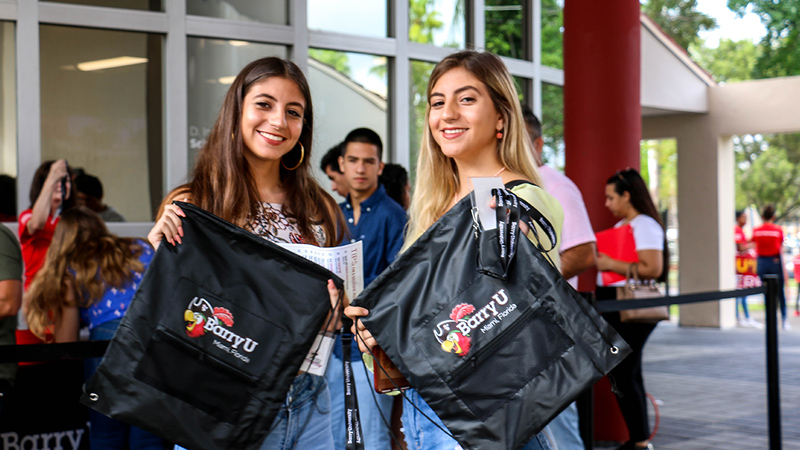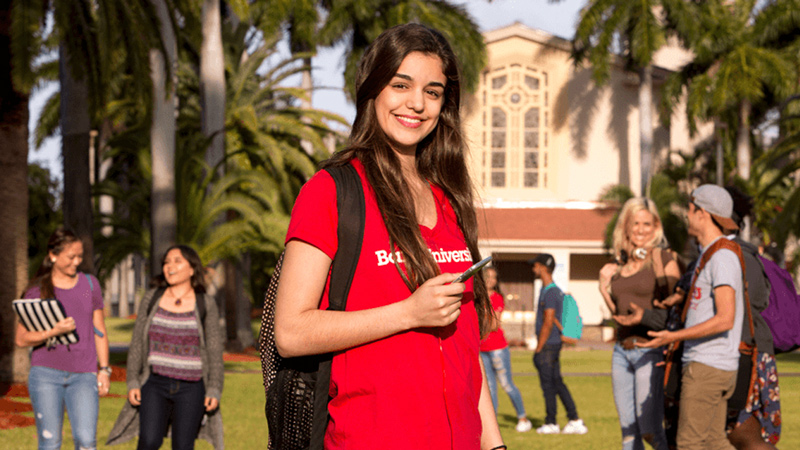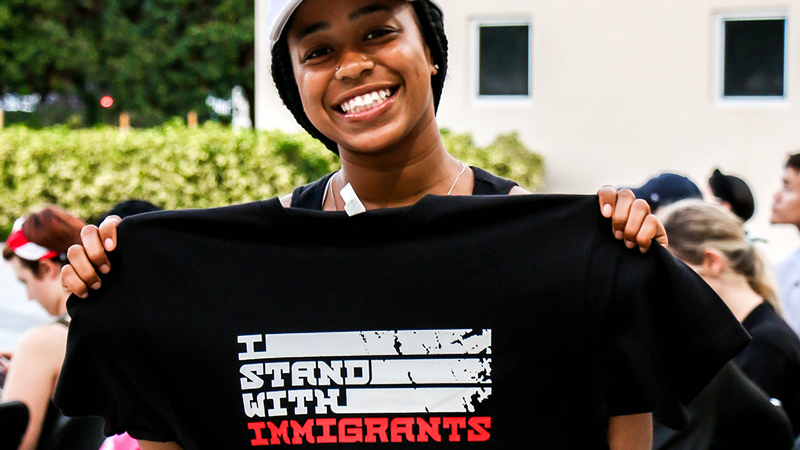Assefa needed a way for Barry students to be able to deliver food orders from 2GO Campus Delivery, an app he launched while a student in 2016, that was fast, affordable, and safe. He knew walking across campus wouldn’t work—what student wanted to do that more than necessary, especially carrying four or five meals with them? And he needed to find an alternative solution to the flashy red tuktuks he had imported from China after one student driver got in trouble for using the vehicle to take friends for joy rides.
By Laura J. Cole How Yoseph Assefa ’16 created a business to better the Earth—and still make a profit. The idea for an electric bike company came not so much out of nowhere, but as a necessity!


“I had to respond to that and find another vehicle that would work,” Assefa says. “And I needed something that was strictly work-oriented and as professional as possible.”
After considering a scooter, he designed and created an electric bike with a longer seat that could hold up to four meals and some drinks behind a rider, as well as a basket on the handlebars for smaller orders.
That solution for one business venture has since become part of the booming global ebike market that Spherical Insights & Consulting estimates will reach $52 billion by 2030. In 2021, Americans bought nearly twice the number of ebikes as electric cars, prompting The Wall Street Journal to call ebikes “the hottest car on the market.” Big-name bike companies such as Trek, Specialized, and Cannondale have several models on the market, and LimeBike, Citi Bike, and Uber offer ebikes for rent through their bike- sharing programs.
But Assefa is focusing on what many are not: the family tourism sector. According to Assefa, Leafy Bikes are “the first and only two-seat electric bikes” available to rent at several locations, including Miami Beach; Fort Lauderdale Beach; Venice Beach; Santa Monica Beach; Great Falls, Maryland; Arlington, Virginia; and Washington, D.C.
“We have been embraced by the ebike community in the past couple of years as it has boomed and try to stay ahead of the innovation with certain features like motion sensors, an alarm system, keyless ignition, a second seat, rear wheel lock, LED headlights, and concierge service,” Assefa says. “The idea definitely snowballed from its original purpose, but shout-out to Barry. It definitely all started at Barry.”

The one thing you need to know about Assefa is if there’s a way, he’ll find it.
That’s how he wound up with a BMW at 13, earned his entrance to Barry and later Harvard Business School, and started 2GO, Leafy Bikes, and Visionary Barber Studio, the latter of which he has since sold to celebrity barber Yandy Blendz.
Assefa grew up in Silver Spring, Maryland, a city in the Washington, DC, metro area, as a second-generation American raised by his single mother and grandmother, who had emigrated from Ethiopia. His mother worked to support their family, with her limited earnings going to food and rent. He says that when he was younger, that wasn’t a problem—until he started wanting the same shoes and clothes and things his friends and classmates had.
“My mom was a single mom who did her best but was not in the financial position to just buy me whatever I wanted, so at the age of 13, I started my first job bagging groceries,” he says. “I was this kid that was just always excited to talk to people and ask them questions about life and their cars and their day, and I think a lot of people took a liking to me. They’d give me $3 and $5 tips—which was a lot of money to me at the time.”
After saving for a couple weeks, he bought some “fresh, new shoes,” and by the time he started high school he had saved $2,500 and decided to purchase a used BMW from Craigslist. It didn’t matter that he was 13 and didn’t have a driver’s license. He was proud of himself—and thought his mom would be proud of him too.
“I came home excited to show her, and woof, was she angry,” he recalls. “Other members of my family were entertained by me buying a car that young, but not my mom. She was disappointed and told me I had to sell it.”
Assefa was upset, but he sold the car and learned an important business lesson.
“Within a day or two after listing it, someone bought it for maybe double what I paid for it,” he says. “I was so happy to have just made a profit from the car that I really struggled to even buy.” The profits didn’t end there. On the way home, he passed by a guy who was screaming at his car that had smoke coming from its engine, and Assefa offered to buy it from him for $400. The man agreed, and Assefa went home and listed it online for $900. Within 30 minutes of posting, he had multiple interests and sold it to the highest offer for $1,750.
"I was so emotional. I was a kid and had just tripled my savings in one day,” he says. “I don’t consider myself a businessman, but I do get a buzz off of trying to solve problems and finding solutions to things. Even with Leafy Bikes, I made that for food delivery. I hadn’t planned on selling or renting them.”
But once he realized he could, that became his focus. Halima “Halma” Abubakar ’15 met Assefa at Barry and the two instantly bonded over their African heritage—she’s Kenyan—as well as similar mindsets and shared classes in communications and marketing.
“A lot of our friends joke that he could run for president, and he’d probably win, if that’s something he wanted,” says Abubakar, who is an oversight manager at the Washington State Charter School Commission. “It’s like, if you want to know somebody who is that dedicated to something that if he says, ‘I’m going to do this’—nobody can tell you how he’ll do it, but he’ll do it.”
As an example, Abubakar cites the time she answered a call from Assefa in China.
“I was like, ‘You’re where? Because you were just in DC,’ and he said, ‘Yeah, I just took a flight because I gotta get these bikes figured out. I needed to come here myself to confirm things.’”
In fact, the first time Assefa went to China, it was during spring break of his junior year—in search of those original tuktuks. He wanted them for delivery purposes but couldn’t find anything online. So he went to find a vendor, despite not knowing the language, having never been to China before, or having a single contact or prospect. He returned triumphant and has since created a network that continues to work with Leafy Bikes.
“When I tell you that story has a lot of miracles, it truly does,” says Abubakar. “Because he really did get those bikes, and he’s got a vendor in China, and they have great communication.”
“Barry definitely saved my life. Being accepted into the school and being exposed to a world beyond my neighborhood are probably the two biggest transitions of my entire life.”
Assefa says if it wasn’t for Barry, he likely would never have started 2GO, which means he wouldn’t have started Leafy Bikes. If necessity is the mother of invention, he credits being accepted to Barry—and specifically Barry’s meal plan—with creating the necessity that forever changed the direction of his life.
Prior to earning a scholarship to attend Barry, Assefa will tell you he did what he needed to get by in high school, was only mildly motivated at Montgomery College in Maryland, and never had plans to leave his neighborhood. He was always more interested in making money than grades.

His interest in moving away can frankly be traced back to a high school crush who attended Barry. With a spur-of-the-moment decision, Assefa decided to visit her, but when he arrived, he quickly became enamored with the campus and Miami.
“When I set foot on the campus,” says Assefa, “it was love at first sight.” But it wasn’t the affection he felt for his crush; it was an infatuation with the university itself.
“This was the most beautiful school I had ever seen,” Assefa says. “They had a pool on campus and jet skis for rent across the street from my hotel. It felt like a dream come true. Spending 45 minutes on campus gave me the motivation I needed to get out of DC.”
When he returned home, Assefa lied and told his mom he got a scholarship. Then he spent the first half of the summer putting in the work to make that lie a reality.
“I got on my grades and completely went extremely hard,” he says. “I went to summer school and did everything I had to, and in the end, I got the scholarship. It’s like I spoke it into existence. I arrived in Miami with maybe $400 to my name. The taxi to campus cost $100, but I hopped into that car like I was the Fresh Prince of Bel-Air.”
That first semester, the money-conscious Assefa found himself in a predicament: He had all these paid meals available to him, but they were going to waste because between his class schedule, working as a work-study student for the IT department, and volunteering with Miami Coalition for the Homeless, he wasn’t eating at the cafeteria for breakfast and often missed dinner. He needed to find a solution to stop skipping meals and having the food brought to him seemed like a no-brainer. So he worked with Chartwells, the campus’ dining services vendor, to provide room service on campus and to hire Barry students to do the deliveries. He launched the 2GO app on Dec. 29, 2016, before the boom of food delivery services like Uber Eats, DoorDash, and Grubhub.
“When you’re in a specific place in your life, you think about how to cater to that specific audience,” Abubakar says. “At the time, he was in college, and he was thinking, ‘How can I make a college student’s life easier?’ Now to think that because of that idea there are stores in Miami Beach—the place to hang out when we were in college—you can rent Leafy Bikes. It’s crazy.”
That’s not to say it happened overnight. Assefa spent nearly a year making prototypes, learning about product design, mechanical engineering, trademarking, branding, and importing—real-life applications on top of his courses in public relations and finance. Soon after the ebikes debuted on campus, a professor asked if he could purchase one, and true to form, Assefa came up with a price on the spot. One sale turned into several, while Assefa worked to figure out a pricing structure.
“We sold maybe four or five bikes in a matter of two or three weeks,” Assefa says. “That’s when I said ‘OK, maybe this can be a side business’—and eventually it became the main business. Over time, people have become ecstatic about the bikes, and we’ve never created another model. We just keep modifying it.”
Today, Leafy Bikes are available to rent for $35 an hour or $100 a day, and new bikes are available in several colors to purchase starting around $1,500 plus tax, depending on the size of the bike. Used bikes are available at discounted rates.
As the micromobility movement continues to boom, Assefa is working to expand rental offerings to tourism hot spots in Arizona, Colorado, New York, Oregon, Texas, and Washington, as well as globally.
But no matter how far they expand and how much customer needs evolve, for Assefa, the one thing that won’t change is Leafy Bikes’ connection to Barry.
“If I hadn’t gone to Barry, I wouldn’t have been exposed to the meal plan, and then I wouldn’t have made the 2GO app,” Assefa says. “If I didn’t make the app, I wouldn’t have made the bikes. And if I didn’t make the bikes, I wouldn’t be exactly where I am today.”



















